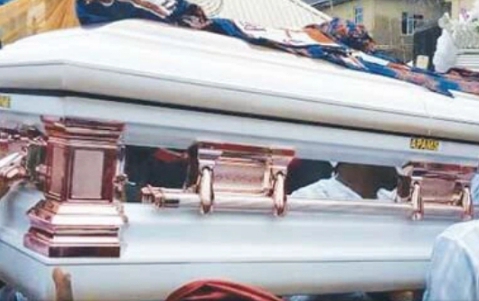The Anambra State Government has reinforced its ban on the public display of caskets for fabrication and sale, as stated in a law passed by the state House of Assembly on Thursday to regulate burial and funeral activities.
The law requires mortuary attendants to report to the Ministry of Health for any corpse that exceeds one month from the date of deposit, with a penalty of N100,000 or six months imprisonment or both for contravention.
Furthermore, the law mandates the registration of all burial and funeral ceremonies of indigenous deceased persons with the town union of the deceased.
Related News: Ibadan Residents Blame Malian Illegal Miners for Fatal Explosion, Tinubu Calls for Action
It prohibits the blocking of roads and streets during burial ceremonies without permission from the appropriate Local Government Authority.
Governor Chukwuma Soludo commended the assembly for the legislation, emphasizing the progressive nature of the Anambra Burial Law in alleviating burdens on the poor and liberating women from oppressive practices during burials.
The law, enacted in 2019 during the tenure of former governor Willie Obiano, has become contentious recently, with the state government reaffirming its commitment to enforcing all provisions.
Key Points of the Anambra State Burial/Funeral Ceremonial Control Law:
- Enacted on April 9, 2019, by the Anambra State House of Assembly.
- Requires the registration and payment of N1,500 to the town union for the burial/funeral ceremonies of an indigenous deceased person.
- Prohibits the erection of billboards, banners, and posters of deceased persons; only directional posts are allowed.
- Penalties for contravention include a fine of N100,000, six months imprisonment, or both.
- Limits the stay of a corpse in the mortuary beyond two months from the date of death, with penalties for violations.
- Roads can only be blocked for burial ceremonies with permission from the appropriate local government authority.
- Prohibits the public display of caskets for fabrication and sale, with penalties for violators.
- Restricts second funeral rites after burial, except in the case of legacy.
- Prohibits wake-keep for any deceased person, with religious activities ending by 9 pm.
- Restricts food, drink, live band, and cultural entertainers during and after religious activities for the deceased.
- Limits the exposure of embalmed corpses to not more than 30 minutes.
- Caps the number of undertakers at six, with no undertakers’ display during the burial ceremony.
- Bans burials on any local market day in the state, with restrictions on funeral brochures.
- Sets a mourning period of no more than one week from the date of burial/funeral.
- Magistrate courts have original jurisdiction over matters specified under the Anambra Burial Law if found guilty.


